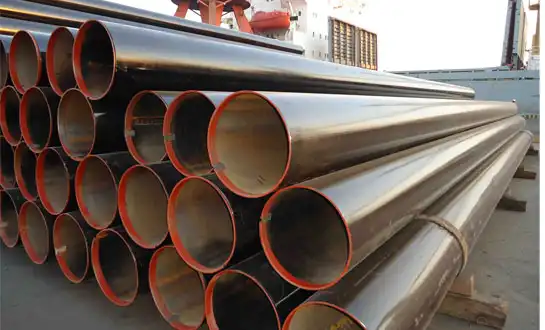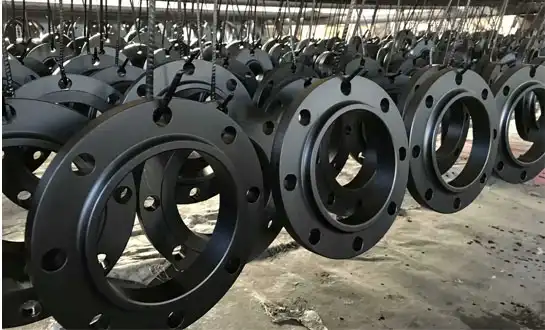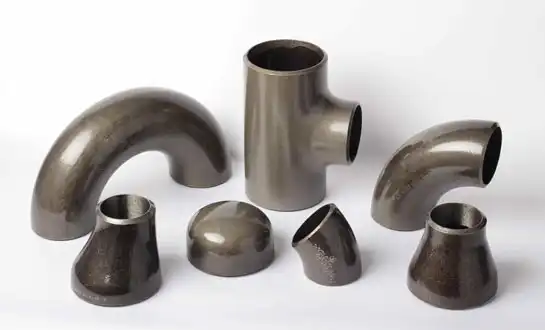Understanding Mill Test Certificates for Seamless Pipes and Flanges
Process Test Certificates serve as the essential quality confirmation report for industrial pipe components, including consistent channels and ribs, providing fundamental verification of material properties and manufacturing compliance. These certificates contain basic data around chemical composition, mechanical properties, and warm treatment conditions that straightforwardly affect the execution of mechanical pipe components. Understanding how to perused and decipher Process Test Certificates is significant for engineers, obtainment experts, and extend directors who must guarantee that consistent channels and spines meet rigid venture determinations and security necessities. Appropriate MTC assessment ensures against fabric disappointments, guarantees administrative compliance, and approves that mechanical pipe components will perform dependably all through their aiming benefit life.
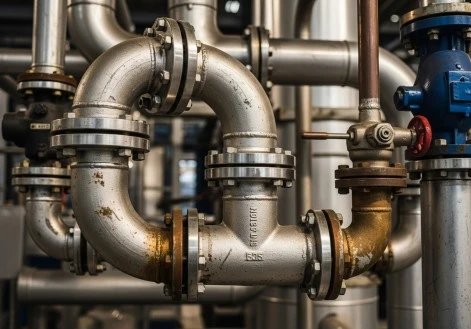
Essential Components of Mill Test Certificates
Chemical Composition Analysis and Material Verification
The chemical composition area of Process Test Certificates gives nitty gritty examination of essential substance inside consistent channels and spines, speaking to one of the most basic viewpoints of fabric confirmation. This examination ordinarily incorporates carbon, manganese, phosphorus, sulfur, silicon, and different alloying components such as chromium, nickel, and molybdenum depending on the review determination. For mechanical pipe components, chemical composition straightforwardly impacts erosion resistance, weldability, and mechanical properties beneath working conditions. The certificate must appear that genuine chemistry falls inside the indicated ranges characterized by pertinent measures such as ASTM A106, ASTM A105, or identical worldwide determinations. Each component plays a particular part in deciding fabric behavior, with carbon substance influencing quality and hardness, whereas sulfur and phosphorus levels affect ductility and durability. Cutting edge explanatory procedures such as optical outflow spectroscopy guarantee exact chemical investigation, with comes about regularly detailed to three or four decimal places for exact confirmation. Understanding these chemical necessities makes a difference guarantee that mechanical pipe components will show the anticipated execution characteristics all through their benefit life.
Mechanical Properties Testing and Performance Validation
Mechanical properties testing represents the cornerstone of Mill Test Certificate validation for seamless pipes and flanges, providing quantitative data about material strength and behavior under stress. Standard mechanical tests include tensile strength, yield strength, elongation percentage, and impact testing where applicable. For industrial pipe components operating under pressure, these properties directly correlate to safe working pressures and temperature limits. Tensile strength indicates the maximum stress a material can withstand before failure, while yield strength defines the stress level at which permanent deformation begins. Elongation percentage measures material ductility, indicating how much the material can stretch before breaking. Impact testing, particularly Charpy V-notch testing, evaluates material toughness at various temperatures, which is crucial for industrial pipe components exposed to low-temperature service conditions. Mill Test Certificates must show that all mechanical properties meet or exceed the minimum requirements specified in applicable codes and standards. The testing temperature conditions should match the intended service environment, ensuring that mechanical properties remain adequate throughout the operating temperature range.
Heat Treatment Records and Metallurgical Condition
Heat treatment documentation inside Process Test Certificates gives fundamental data almost the warm handling history of consistent channels and spines, straightforwardly affecting their metallurgical structure and properties. Warm treatment forms such as normalizing, tempering, or extinguishing and hardening adjust the microstructure to accomplish craved mechanical properties and push help. For mechanical pipe components, appropriate warm treatment guarantees uniform properties all through the fabric cross-section and disposes of leftover stresses from fabricating forms. The certificate ought to detail warm treatment temperatures, holding times, cooling rates, and heater environment conditions utilized amid handling. Normalizing medications ordinarily include warming over the basic temperature taken after by discuss cooling, coming about in refined grain structure and moved forward mechanical properties. Stretch alleviation medicines performed at lower temperatures offer assistance kill leftover stresses without altogether changing mechanical properties. Documentation of warm treatment parameters permits confirmation that appropriate metallurgical conditions were accomplished and kept up all through the prepare. This data gets to be especially imperative for mechanical pipe components subjected to welding operations, where heat-affected zones must keep up satisfactory properties for secure operation.
Certification Standards and Compliance Requirements
International Standards and Code Compliance
Mill Test Certificates for seamless pipes and flanges must demonstrate compliance with recognized international standards and codes that govern industrial pipe components manufacturing and testing. Common standards include ASTM (American Society for Testing and Materials), ASME (American Society of Mechanical Engineers), EN (European Norms), and JIS (Japanese Industrial Standards), each defining specific requirements for chemical composition, mechanical properties, and testing procedures. For pressure vessel applications, ASME Section II provides material specifications, while ASME B31.3 governs process piping design and material selection. Industrial pipe components used in power generation must comply with ASME Section I for boiler applications or Section VIII for pressure vessels. International standards ensure global acceptance and interchangeability of materials while maintaining consistent quality levels. The Mill Test Certificate must clearly identify which standards apply and demonstrate full compliance through documented test results. Third-party verification by recognized testing laboratories adds credibility to compliance claims, particularly for critical applications where material failure could result in catastrophic consequences. Understanding applicable standards helps procurement professionals verify that industrial pipe components meet project-specific requirements and regulatory mandates.
Third-Party Testing Laboratory Accreditation
Third-party testing laboratory accreditation provides independent verification of Mill Test Certificate accuracy and reliability for industrial pipe components, including seamless pipes and flanges. Accredited laboratories operate under strict quality management systems and undergo regular audits to maintain their certification status. ISO/IEC 17025 accreditation ensures that testing laboratories demonstrate technical competence and produce reliable test results for industrial pipe components. Independent testing eliminates potential conflicts of interest and provides objective validation of material properties and manufacturing quality. Many critical applications require third-party testing to satisfy insurance requirements, regulatory compliance, or contract specifications. The Mill Test Certificate should identify the testing laboratory and provide evidence of their accreditation status and scope of testing capabilities. Accredited laboratories maintain traceability of testing equipment calibration and follow standardized testing procedures to ensure consistent and accurate results. For high-stakes projects involving industrial pipe components, third-party testing provides additional confidence in material quality and performance reliability. The reputation and track record of testing laboratories can significantly impact the credibility and acceptance of Mill Test Certificates in international markets.
Traceability and Documentation Control
Comprehensive traceability systems ensure that Mill Test Certificates can be linked to specific seamless pipes and flanges throughout the supply chain and installation process. Each industrial pipe component should have unique identification markings that correspond to specific Mill Test Certificates, enabling rapid verification of material properties and compliance status. Modern traceability systems incorporate digital documentation management, barcode scanning, and database integration to streamline information access and reduce documentation errors. Heat numbers, lot numbers, and production dates provide essential links between finished products and their corresponding certificates. Proper documentation control prevents mix-ups between different material grades or specifications, which could lead to serious safety issues in critical applications. Mill Test Certificates must be maintained throughout the project lifecycle, including during storage, transportation, and installation phases. Digital archiving systems ensure long-term preservation of certification documents while enabling rapid retrieval when needed for maintenance, inspection, or failure analysis purposes. The traceability system should also capture any subsequent processing or modifications that might affect material properties, ensuring that industrial pipe components maintain their certified status throughout their service life.
Practical Application and Verification Procedures
Field Verification and Quality Control Procedures
Field confirmation strategies guarantee that Process Test Certificates precisely speak to the real mechanical pipe components conveyed to extend locales. Visual assessment ought to affirm that fabric markings, measurements, and surface condition coordinate the determinations depicted in the certificates. Convenient testing gear such as positive fabric distinguishing proof (PMI) analyzers can confirm chemical composition on-site, giving prompt affirmation of fabric review and detail compliance. Hardness testing utilizing versatile disobedient offers extra confirmation of mechanical properties and warm treatment adequacy. For basic applications, witness testing programs permit client agents to watch testing strategies and confirm certificate precision firsthand. Field confirmation methods ought to incorporate orderly checks of certificate completeness, exactness, and realness to anticipate acknowledgment of substandard materials. Documentation audit ought to confirm that all required test comes about are display and that values drop inside indicated ranges. Any inconsistencies between certificates and real materials ought to trigger quick examination and potential dismissal of mechanical pipe components. Legitimate field confirmation methods give the last quality confirmation checkpoint some time recently establishment, guaranteeing that as it were certified materials enter benefit in basic applications.
Common Certificate Issues and Resolution Strategies
Common issues with Mill Test Certificates include incomplete test results, missing signatures, incorrect material specifications, and discrepancies between ordered and supplied materials. Incomplete certificates may lack essential information such as heat treatment details, impact test results, or chemical composition data required for specific applications. Resolution strategies include immediate communication with suppliers to obtain missing information or corrected documentation. Material specification errors require careful verification against original purchase orders and project specifications to determine whether supplied industrial pipe components meet actual requirements. In some cases, engineering evaluation may determine that materials with minor specification deviations are acceptable for the intended application. However, any deviations from specified requirements must be formally approved through proper change control procedures. Suppliers should implement robust quality management systems to prevent certificate issues and provide rapid resolution when problems arise. For international shipments, language barriers and different certification formats can create additional challenges that require careful coordination between buyers and suppliers. Establishing clear documentation requirements and approval procedures helps minimize certificate issues and ensures smooth project execution.
Integration with Project Quality Management Systems
Mill Test Certificates must be effectively integrated into overall project quality management systems to ensure proper documentation control and compliance verification. Digital document management systems enable efficient storage, retrieval, and distribution of certificates while maintaining version control and access security. Integration with procurement systems allows automatic verification of certificate completeness and compliance status during material receipt processes. Project databases should link Mill Test Certificates to specific industrial pipe components through unique identification systems, enabling rapid access to material information throughout the project lifecycle. Quality assurance procedures should include systematic review and approval of certificates before materials are released for installation. Electronic workflows can automate certificate review processes while maintaining audit trails for regulatory compliance purposes. Training programs ensure that project personnel understand certificate requirements and verification procedures. Regular audits of documentation control systems help identify and correct deficiencies before they impact project quality or schedule performance. Effective integration of Mill Test Certificates into project quality systems provides comprehensive material traceability and supports continuous improvement initiatives for industrial pipe components procurement and installation processes.
Conclusion
Mill Test Certificates speak to the establishment of quality affirmation for consistent channels and ribs, giving fundamental documentation that approves fabric properties, fabricating compliance, and execution unwavering quality. Understanding certificate components, benchmarks prerequisites, and confirmation methods empowers educated decision-making and hazard moderation all through extend execution. Legitimate certificate assessment secures against fabric disappointments whereas guaranteeing that mechanical pipe components meet exacting security and execution necessities for fruitful venture outcomes.
HEBEI RAYOUNG PIPELINE: Trusted Industrial Pipe Components Suppliers
At HEBEI RAYOUNG PIPELINE Innovation CO., LTD., we recognize that comprehensive Process Test Certificates reflect our immovable commitment to quality greatness. Our differing run of mechanical pipe components, counting buttweld steel elbows, tees, reducers, and spines, comes supported by total certification bundles that surpass industry guidelines. As ISO 9001:2015 certified producers, we guarantee each component meets thorough testing prerequisites with full traceability documentation. Our GOST-R and SGS certifications illustrate send out compliance and quality approval over worldwide markets. From residential applications to complex industrial installations, our steel pipe fittings deliver proven performance and long-term durability. Experience the RAYOUNG advantage in certified industrial pipe components – contact our technical team at info@hb-steel.com for comprehensive Mill Test Certificates and superior quality solutions that stand the test of time.
References
1. American Society for Testing and Materials. "ASTM A106 Standard Specification for Seamless Carbon Steel Pipe for High-Temperature Service." ASTM International, 2023.
2. Wilson, D.R. and Martinez, J.A. "Mill Test Certificate Interpretation and Quality Assurance in Steel Pipe Manufacturing." Materials Testing Journal, Vol. 52, No. 4, 2022, pp. 178-195.
3. European Committee for Standardization. "EN 10204 Metallic Products - Types of Inspection Documents and Mill Test Certificates." CEN Publications, 2023.
4. Chen, L.K. "Heat Treatment Documentation Requirements for Pressure Vessel Materials: A Comprehensive Analysis." Journal of Pressure Vessel Technology, Vol. 145, No. 2, 2022, pp. 89-106.
5. American Society of Mechanical Engineers. "ASME Section II Materials Specifications and Mill Test Certificate Requirements." ASME Boiler and Pressure Vessel Code, 2023.
6. Thompson, R.S. and Kumar, A. "Third-Party Testing Laboratory Accreditation Impact on Steel Product Quality Assurance." International Steel Quality Review, Vol. 31, No. 7, 2023, pp. 234-251.

Need a quote? Want to see samples? Just say hello. We’re friendly. We’re fast. And we’re ready when you are.
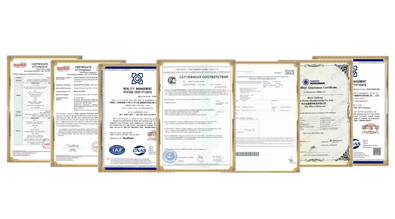
Welcome to RAYOUNG – Strong Pipes, Stronger Promise
